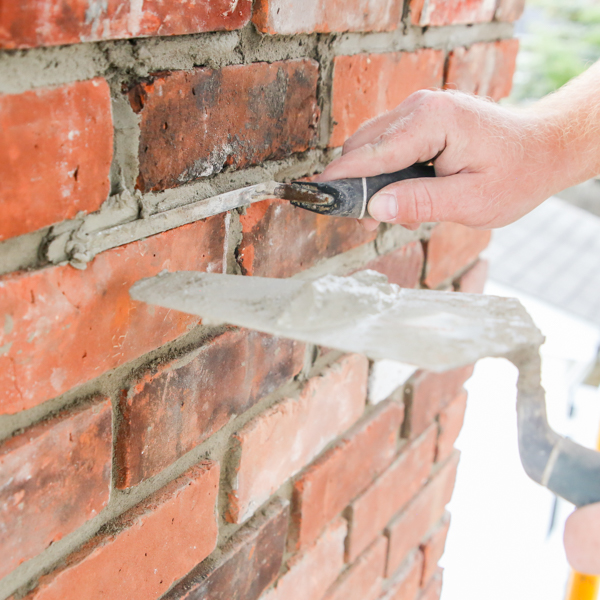Trustworthy Chimney Services: Maintenance and Fix Done Right
Trustworthy Chimney Services: Maintenance and Fix Done Right
Blog Article
Unlocking the Secrets of Sustainable Masonry Building Practices for Eco-Friendly Buildings
In the world of modern-day construction, the search of sustainable techniques has ended up being paramount. Among the myriad strategies to environmentally friendly building, sustainable masonry building stands out as a reliable and sturdy method that holds a wealth of untapped potential. From the option of products to cutting-edge building and construction strategies, the tricks to attaining sustainability within stonework building are diverse and fascinating. By discovering the benefits, products, strategies, and future trends of sustainable masonry, a deeper understanding of exactly how these techniques can form the future of green structures emerges.
Benefits of Lasting Masonry Building
Welcoming lasting masonry construction practices not only minimizes environmental effect yet additionally offers lasting economic advantages to contractors and neighborhoods. By utilizing materials like recycled blocks, obstructs, and rocks, home builders can dramatically decrease the carbon footprint of their tasks while promoting resource performance. In addition, sustainable stonework building strategies, such as appropriate insulation and thermal mass properties, can boost power effectiveness within structures, bring about decreased functional prices gradually.
In addition, the toughness and durability of masonry frameworks contribute to long-lasting economic advantages. Buildings built utilizing sustainable masonry practices often require much less maintenance and repair, converting to cost financial savings for contractors and residential or commercial property proprietors. The longevity of stonework products also makes certain that structures continue to be stable and secure, lowering the need for constant restorations or replacements.
Eco-Friendly Stonework Materials
Making use of environmentally friendly masonry products is a crucial action towards enhancing the sustainability of building techniques and reducing environmental influence while making best use of long-lasting financial benefits. Lasting masonry materials are sourced, created, and made use of in a way that lowers overall environmental impact. Sustainable concrete blocks incorporate recycled aggregates and may feature improved insulation residential or commercial properties, adding to power effectiveness in buildings.
In addition, natural products like adobe, rammed earth, and straw bundles supply exceptional thermal mass buildings, decreasing the requirement for heating and cooling down power. These materials are usually locally offered, promoting local economic situations and decreasing transportation-related carbon exhausts. By selecting green masonry products, construction tasks can considerably lower their environmental footprint and add to the development of much healthier, more sustainable constructed atmospheres.
Energy-Efficient Stonework Techniques
Energy performance plays an important duty in enhancing the sustainability of stonework building methods. One key energy-efficient masonry strategy is the use of thermal mass, which involves integrating dense materials like concrete sites or block into the building's framework to take in and store warm.

Developments in Sustainable Masonry
Recent developments in lasting stonework methods have actually produced cutting-edge techniques that are improving the building industry. One such advancement is the advancement of self-healing concrete, which uses microorganisms embedded within the concrete to recover cracks autonomously. This advancement not just minimizes maintenance costs however likewise enhances the resilience of stonework frameworks, adding to their sustainability.
One more noteworthy innovation is using recycled aggregates in stonework construction - masonry contractor. By incorporating materials such as crushed ceramic waste or recycled glass into concrete blends, home builders address can lower the ecological effect of building and construction jobs while preserving structural integrity. This technique not just draws away waste from land fills but also preserves all-natural resources, making it an essential improvement in lasting masonry construction
Moreover, the integration of electronic design devices, such as Building Info Modeling (BIM), is changing the way stonework frameworks are intended and created. BIM enables more specific estimations, reduced product waste, and improved energy efficiency, eventually bring about more sustainable structure methods. These innovations collectively represent an appealing future for sustainable stonework construction in the era of environmentally friendly buildings.
Future Trends in Masonry Sustainability
With the ingenious strides made in sustainable stonework methods, the future trends in stonework sustainability are positioned to further reinvent the construction industry. Among the key trends shaping the future of stonework sustainability is the enhanced assimilation of technology. morris concrete design Advancements such as Building Information Modeling (BIM) and digital truth simulations are being used to optimize stonework construction processes, resulting in minimized material waste and enhanced energy efficiency in buildings.
Additionally, the growth of novel sustainable products is readied to play a substantial role in enhancing the eco-friendliness of masonry building and construction. masonry contractor. Advancements like self-healing concrete, recycled aggregates, and bio-based binders are gaining grip for their capability to decrease environmental impact while maintaining structural integrity

Conclusion
Finally, lasting stonework building methods offer numerous advantages for environmentally friendly structures. By using environment-friendly products and energy-efficient strategies, stonework can add to a much more lasting built atmosphere. Technologies in lasting stonework are continually being created to better boost the ecological efficiency of structures. Looking towards the future, the trend of masonry sustainability is expected to grow, resulting in more eco-friendly and energy-efficient building methods in the years to find.
Report this page